XLIII. The basketball factory
30 years ago, the last triumph of KK Jugoplastika, one of the most dominant teams in the European history. Inside a pair of Adidas shoes, we discover an economic and cultural philosophy
Hi,
welcome back to BarBalkans, the Italian newsletter whose aim is to give a voice to the Western Balkans’ stories, on the 30th anniversary of the Yugoslav Wars.
How many stories can be hidden inside a pair of shoes? Just a few or many, it depends on who and how is wearing them.
However, sometimes it may happen that even brand new shoes have an incredible past to tell.
This is the case of the special Adidas “Ćevape & Fries” collection. Last November, only 150 pairs were made exclusively available at the German retailer’s BSTN webstore via raffle.
The collection is dedicated to Jugoplastika, “the gold of Split”.
Jugoplastika was both the legendary Split basketball team, but also the flagship of the Yugoslav industry.
And the relationship with Adidas has a great story to tell.
Jugotime
1948 is the year that marks the beginning of the history of KK Jugoplastika, one of the most dominant teams ever seen on an European basketball court.
Until 1967 the team kept the name of the city of origin, KK Split.
But the 1967-1968 season changed everything. First of all, Jugoplastika, a manufacturer of plastic goods, became the major sponsor.
Investments started to flood in the sports team, which made it to the Yugoslav top-tier level Yugoslav First Federal League (YUBA Liga) only 4 years earlier.
The first period of glory was in the Seventies. Between 1971 and 1977 the trophy case was filled with three Yugoslavian Cups, two federal titles and two FIBA Korać Cups.
When the Yugoslavian national team became world champion in 1970 - also defeating the United States - a quarter of the team was from Jugoplastika: Ratomir Tvrdić, Damir Šolman and Petar Skansi.
In 1972, the Split team was a whisker away from winning the EuroLeague. Jugoplastika was defeated 70-69 by Ignis Varese.
Only one point away from making history and becoming the first team in Yugoslavia to win the top-tier European professional basketball club competition.
But the real turning-point came in the mid-Eighties.
Also thanks to Jugoplastika, the Yugoslav basketball triumphed in Europe and in the world. To the point to spread a new expression in the basketball world:
“The Americans invented it, the Yugoslavs perfected it”.
A bunch of terrible kids triggered a Showtime - or better, a Jugotime - on the Dalmatian coast.
They were the power-forward Dino Rađa, the forward Toni Kukoć, the center Goran Sobin, the point guard Duško Ivanović. All trained by coach Božidar Boža Maljković.
They created the skeleton of an unstoppable team, which won 4 consecutive YUBA Liga and 2 Yugoslavian Cups between 1987 and 1991.
And thanks to the overwhelming energy of the Split players, Yugoslavia was ready to get its hands on the EuroLeague again.
After Bogdan Tanjević and Mirza Delibašić’s Bosna Sarajevo in 1978-79 and Dražen Petrović’s Cibona Zagreb in 1984-85 and 1985-86, it was the turn of Kukoč and Rađa’s Jugoplastika.
EuroLeague title, repeat and three-peat. Between the 1988-1989 season and the 1990-1991 season the žuti (“the Yellows”, as they were nicknamed) were able to win 3 consecutive European Cups.
A record that is still unbroken. Only ASK Riga was able to do the same, in the first three editions of the competition (1958-1960).
In sequence, Maccabi Elite Tel Aviv and Barcelona (twice) were defeated. The Spanish lost in both cases by 5 points.
It was April 18, 1991, when they triumphed for the third time.
It was Jugotime, that night in Paris, 30 years ago.
The magic seemed like forever for Jugoplastika, which had just changed its name to POP 84 Split.
However, those were the last months of a united Yugoslavia.
And that was also the last dance of one of the most complete, entertaining and dominant teams ever seen on an European basketball court.
In those years, basketball players wore Converse. And Yugoslavia was no exception.
At the same time, thanks to Jugoplastika also Adidas managed to carve out its space - if not on - at least off the court.
The industrial philosophy
About 60 kilometers from Split, in the small town of Brodarica, in 1952 a plastic manufactures factory was founded by the communist authorities.
Not surprisingly, the company was named Jugoplastika.
Toys, bags, beach mats, seat belts and inserts for the automotive industry and all kinds of plastic goods.
The average citizen of the Socialist Federation used and consumed Jugoplastika products every day.
The company stood out in particular for creating jobs for women. At the peak of its activity, 13 thousand people were employed: two out of three were female workers.
It was also thanks to the Jugoplastika’s workers that in the Seventies and in the Eighties millions of Adidas products invaded the Yugoslav market.
From bags to shoes, clothing and sports accessories.
All this happened thanks to the local workforce, as required by the industrial policy of the Federation.
In fact, the Yugoslav model imposed a choice on foreign brands that wanted to sell their products in the Federation territory.
They could build a manufacturing plant in one of the six Socialist Republics. Otherwise, they had to grant a license to one or more Yugoslav companies.
Adidas decided for the second option.
And Jugoplastika - as well as Croatian Borovo, Slovenian Sanino and Serbian Jugotekstil - found itself at the center of an unprecedented sales boom.
The Yugoslavian was a 23-million-consumers market, and the German brand managed to conquer it.
Every year, from the 15 industrial plants that signed an agreement with Adidas, more than 4.5 million products came out.
In the meantime - without even knowing - most Western sportsmen wore shoes, T-shirts and trousers sewn and made in Slovenia, Croatia and Serbia by the impressive Federation’s industrial production.
Jugoplastika best portrayed Yugoslavia’s economic and cultural philosophy.
The priority of the Yugoslavian society was full employment and strategic autonomy, through the involvement of all segments, including women.
Where the cornerstone was the concept of “collective”, from the industrial to the sporting level.
For this reason, the gold of Split is still a story to tell.
Even through a pair of basketball shoes.
Pit stop. Sittin’ at the BarBalkans
We have reached the end of this piece of road.
After admiring the gold of Split, we will stay in the Dalmatian city to taste a local beer.
A beer that embodies the area’s authentic spirit, perhaps, a beer that keeps us at our bar, the BarBalkans, a little longer.
Here we are with a bottle of Barba craft brewery. With a name like that, it is almost destiny...
The brewery’s tradition is almost homemade and has conquered the city with the first Split Craft Brewery.
Using only basic ingredients, such as hops, barley, yeast and water, Barba faithfully respects the Reinheitsgebot, the Bavarian beer purity law of 1516.
Barba is a light ALE, with 5.4% of alcohol. The bitterness combined with a fruity aroma leaves a pleasant sensation on the palate.
Like the memory of Split. A city with a thousand stories to tell, starting from the most common goods in everyday life.
Let’s continue the BarBalkans journey. We’ll meet again in a week, for the 44th stop.
A big hug and have a good journey!
BarBalkans is a free weekly newsletter. Behind these contents there is a lot of work undertaken. If you want to help this project to improve, I kindly ask you to consider the possibility of donating. As a gift, every second Wednesday of the month you will receive a podcast with an article about the dissolution of Yugoslavia.
If you want a preview, just listen to BarBalkans - Podcast. You can find it on Spreaker and Spotify! The last episode was out on Wednesday, don’t miss it!
As always, I thank you for getting this far with me. If you are interested in the role of sports in the former Yugoslavia, I recommend you this previous newsletter (while here you can find all the others):
If you want to help me to make this experience grow, you can invite whoever you want to subscribe to the newsletter:
Pay attention! The first time you will receive the newsletter, it may go to spam, or to “Promotions Tab”, if you use Gmail. Just move it to “Inbox” and, on the top of the e-mail, flag the specific option to receive the next ones there.
BarBalkans is on Facebook and Instagram, while on Linktree you can find the updated archive.

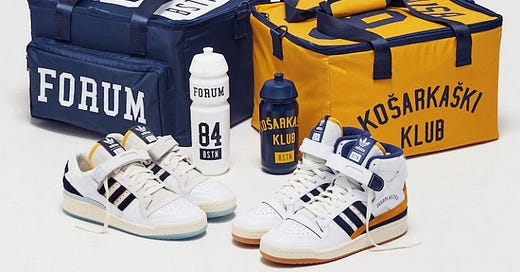


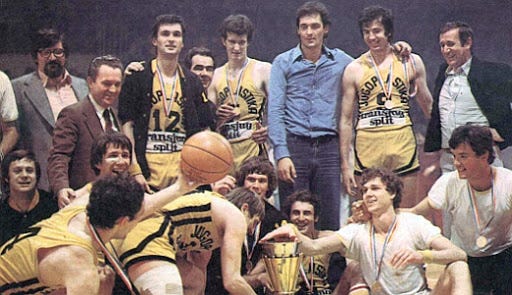


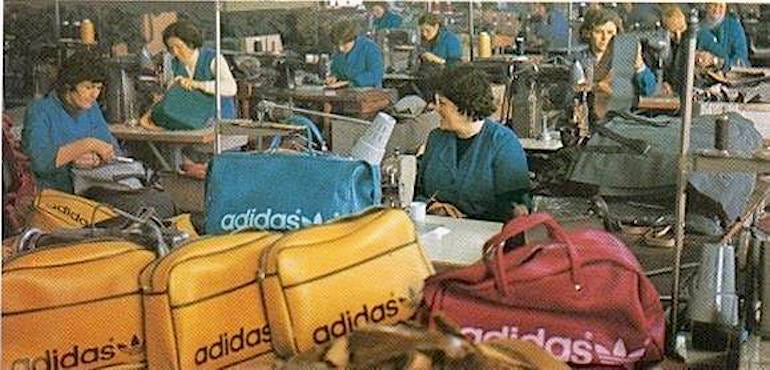
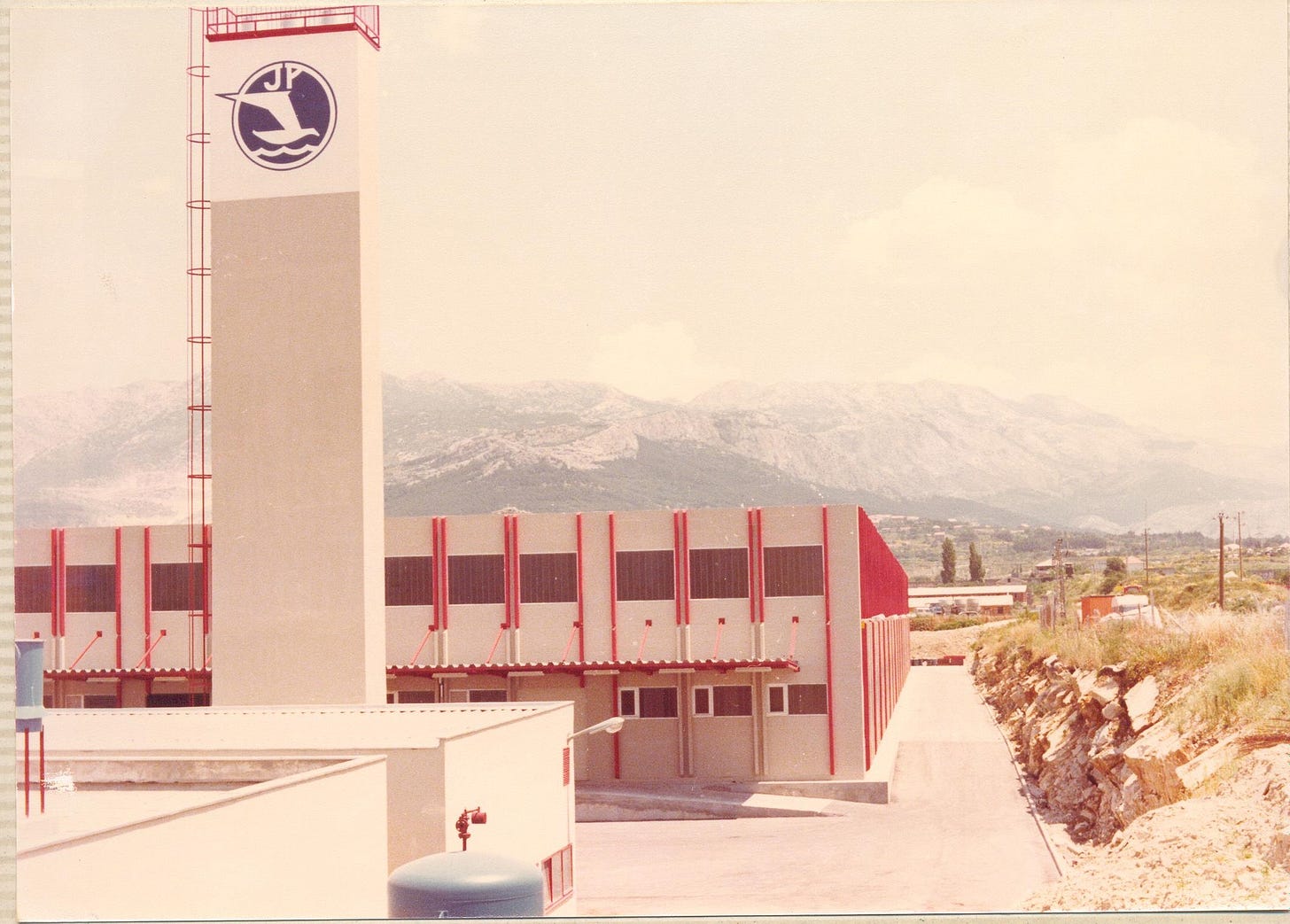
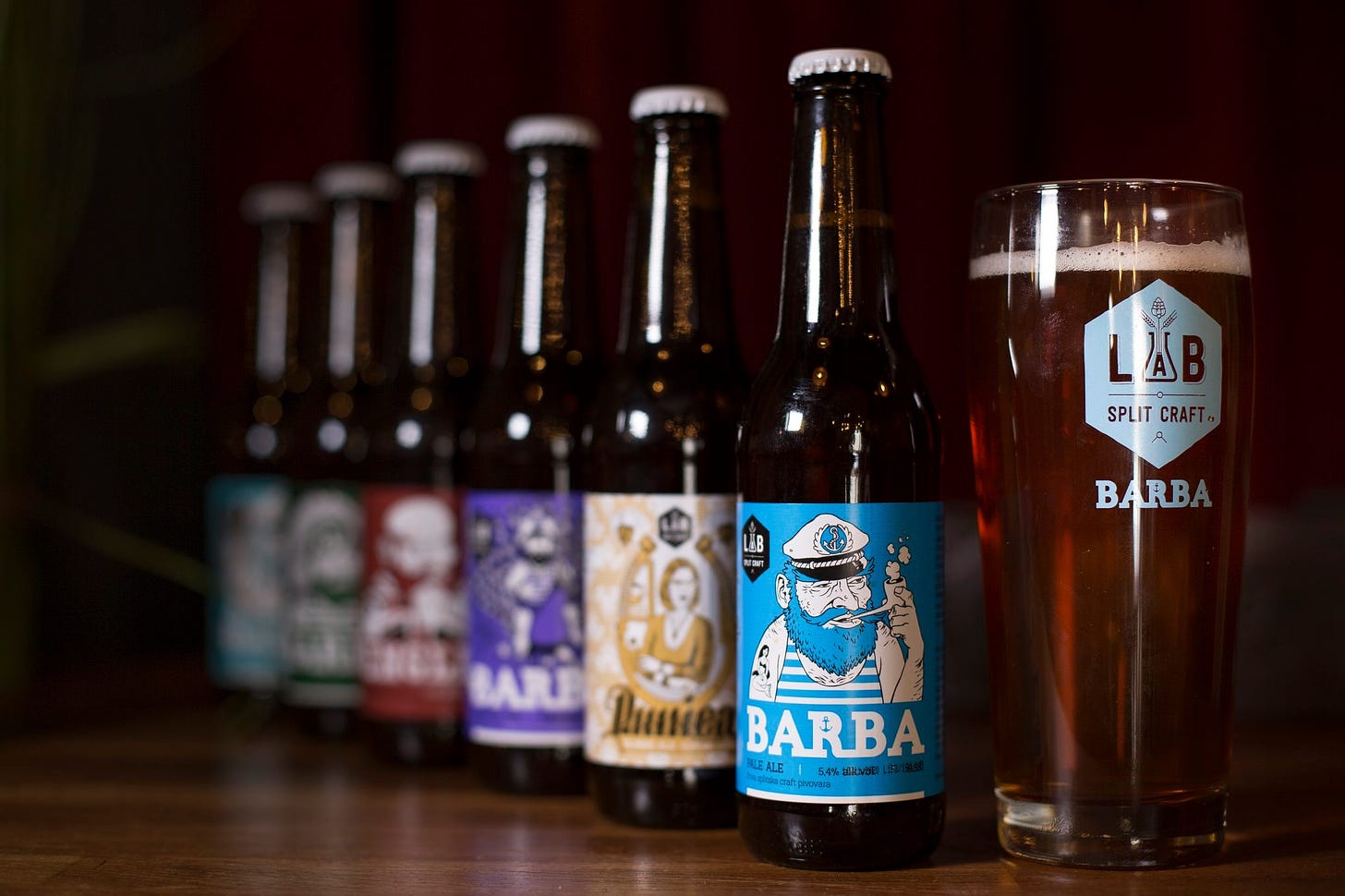
hello. I am preparing a report on the Converse brand and basketball from the 80s and 90s. I learned that this brand had a company that manufactured some models of its sneakers in Yugoslavia, in a Slovenian town. Do you have any information about it that can help me complete my text?
Thanks